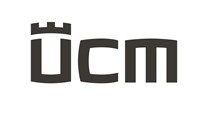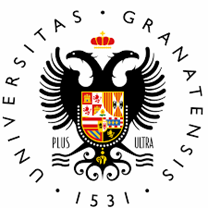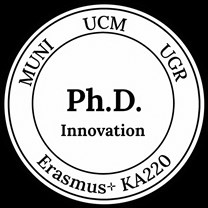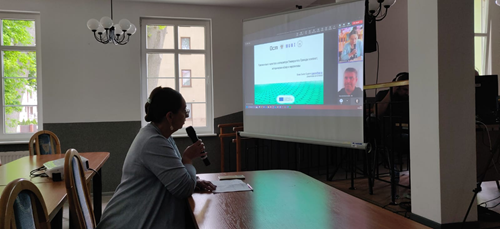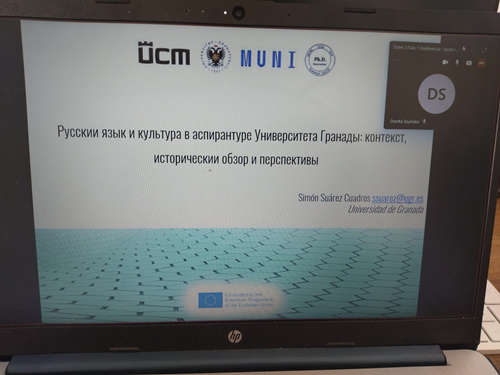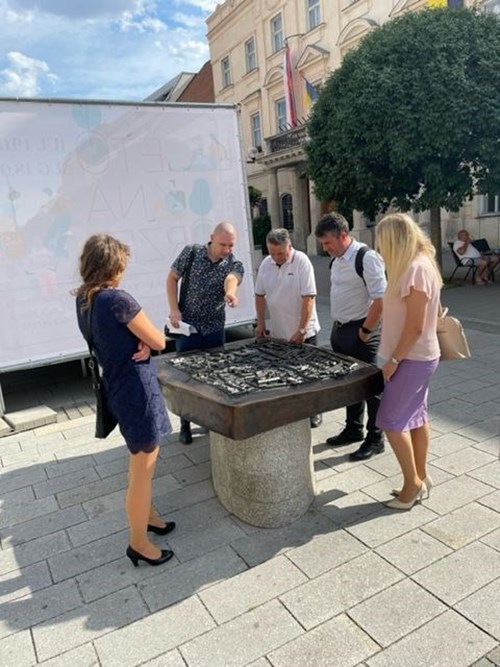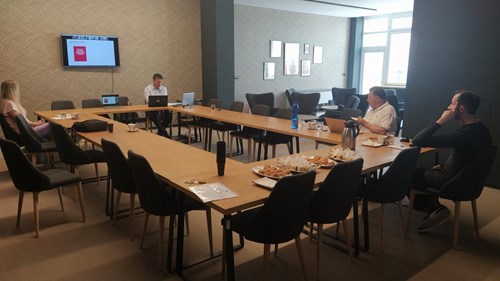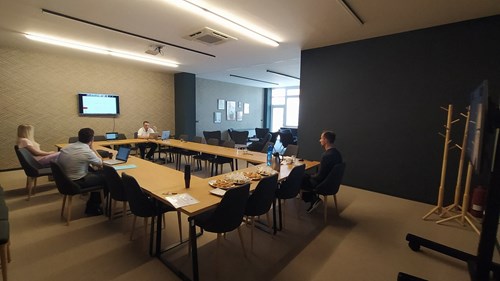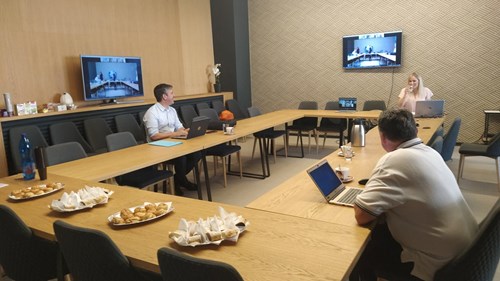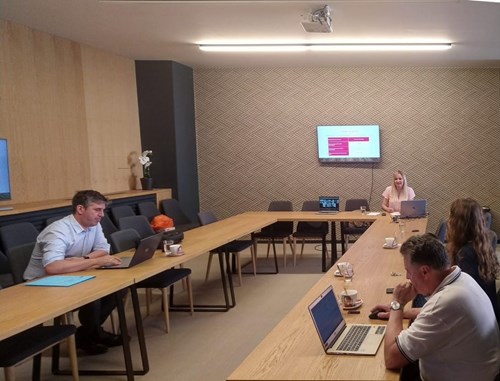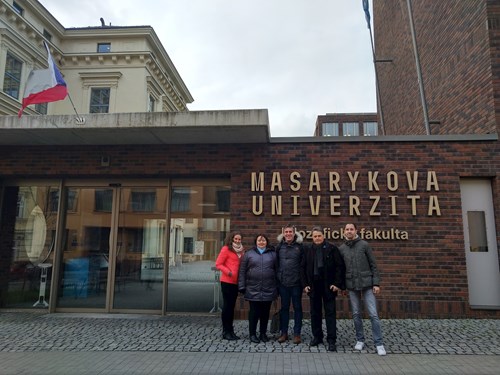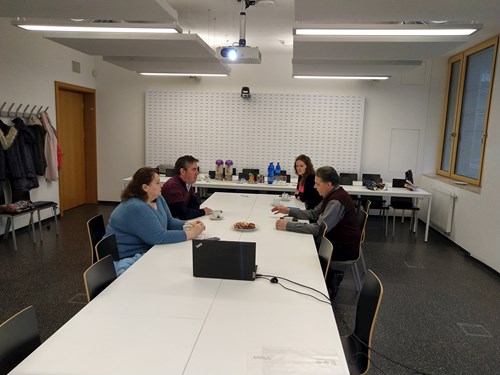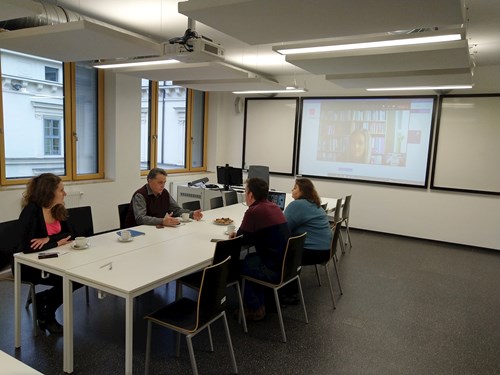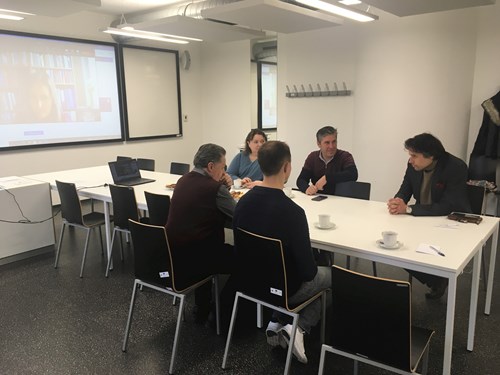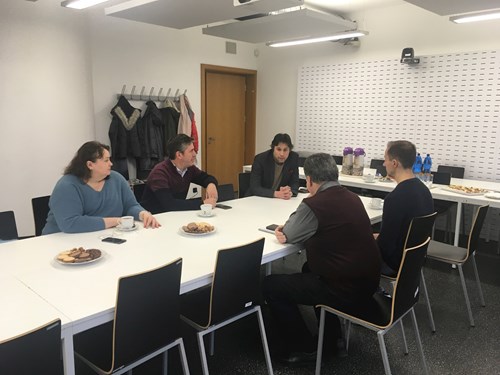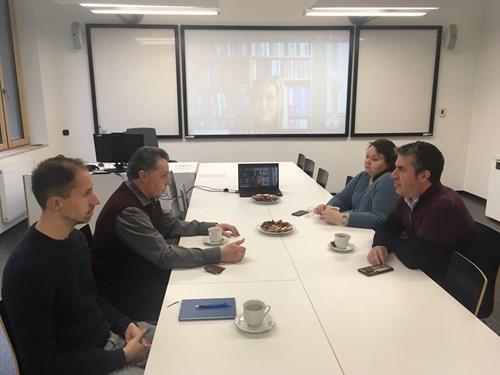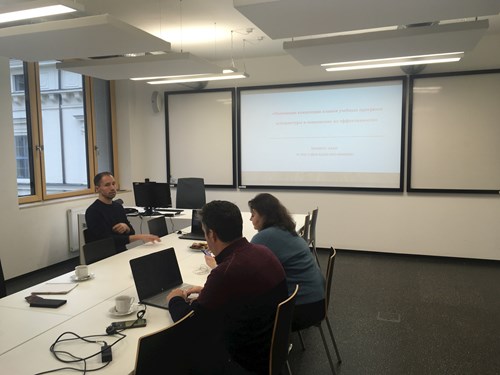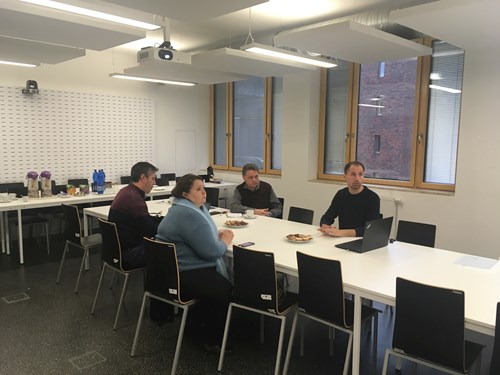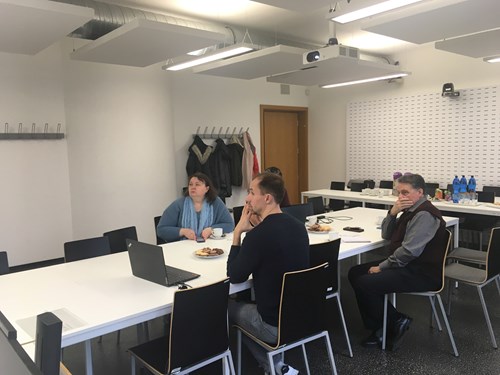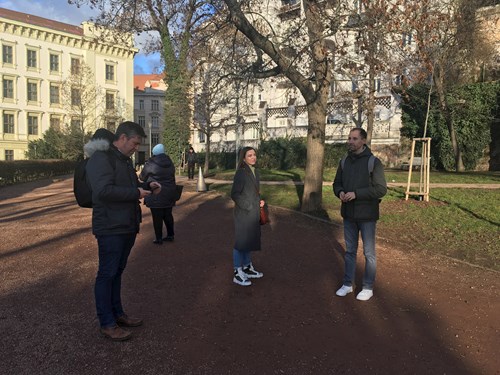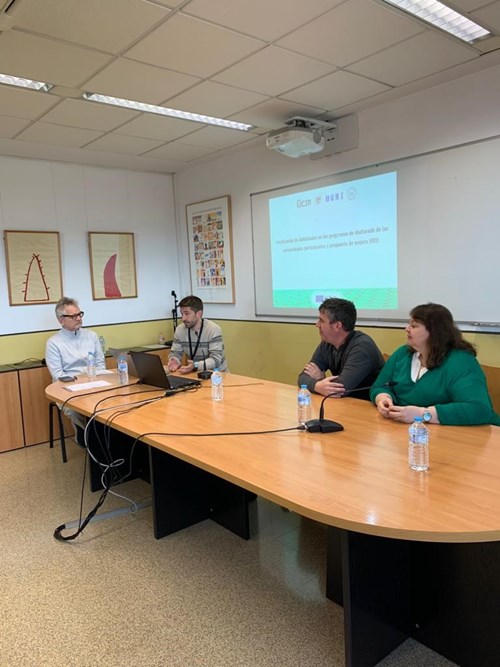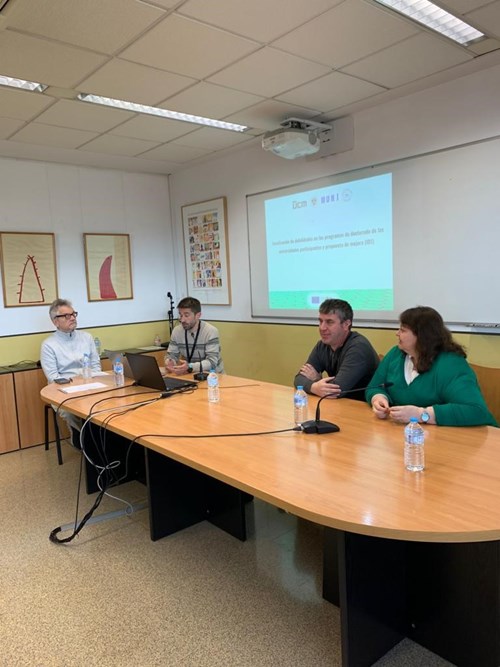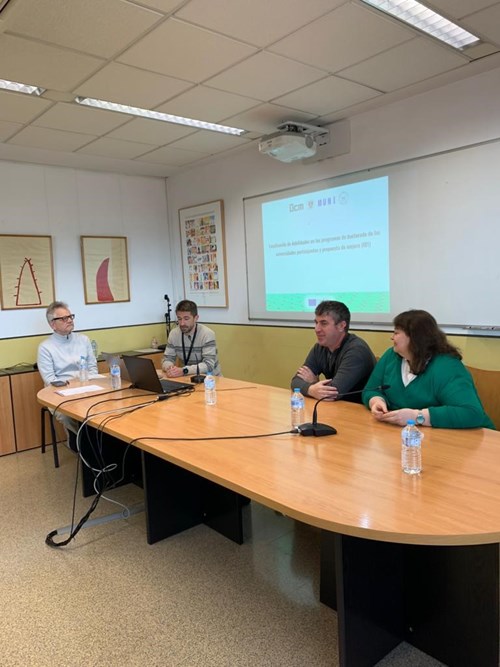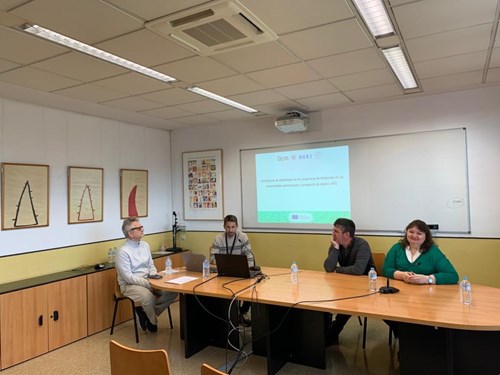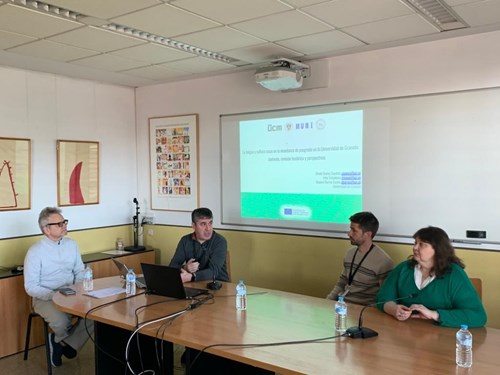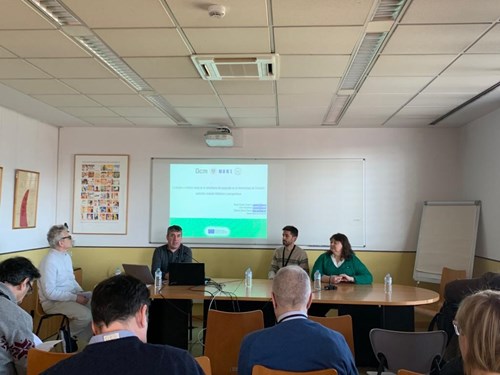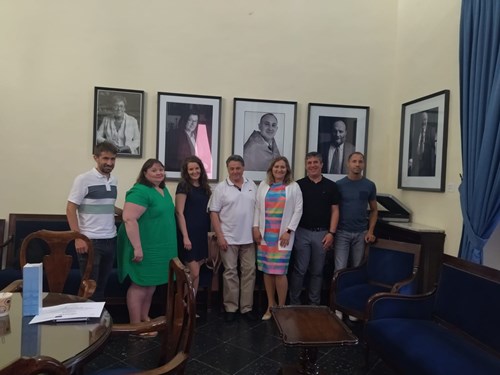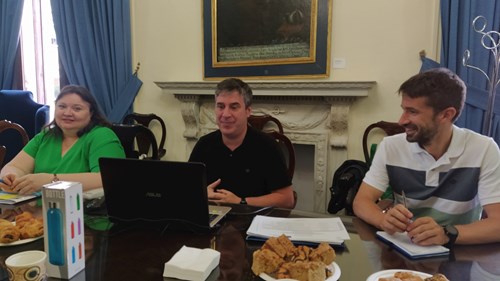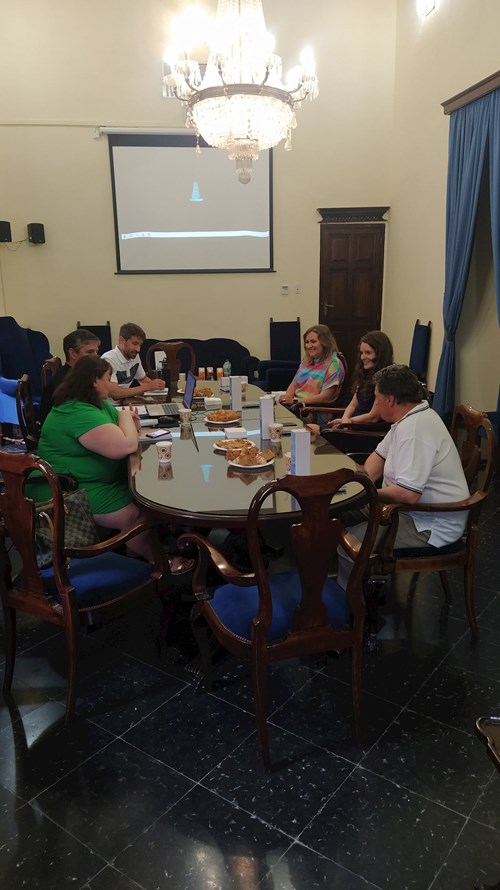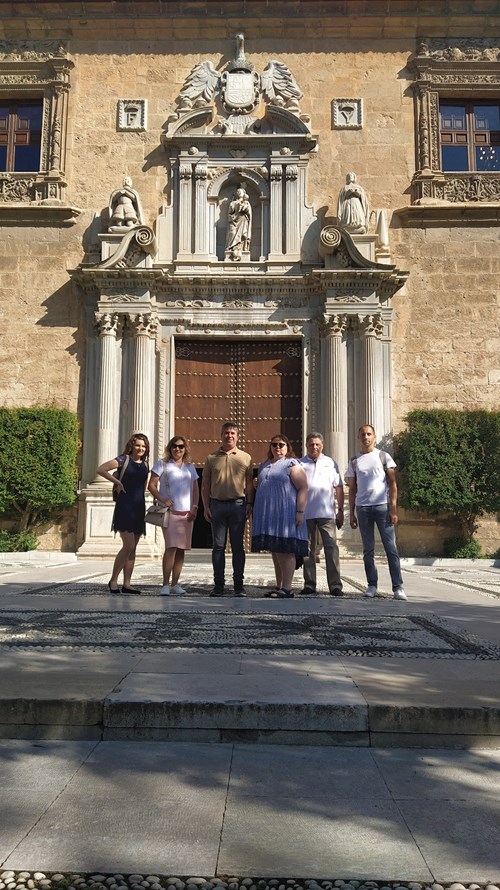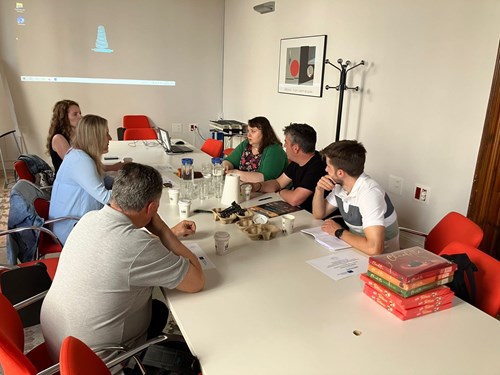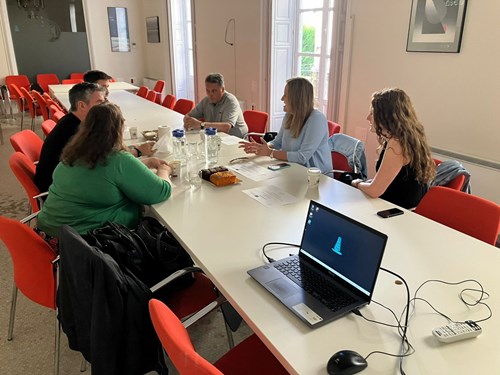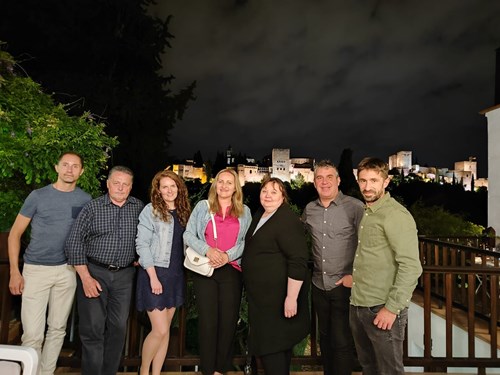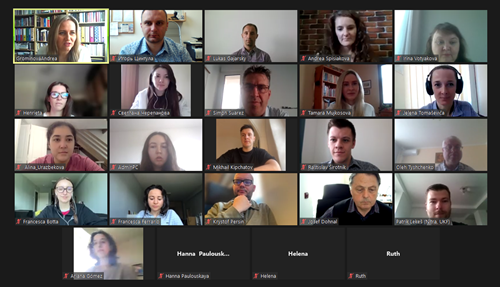Grant type: international Erasmus+ project KA220-HED – Cooperation partnerships in higher education
Project number: 2021-1-SK01-KA220-HED-000022917
Project title: The innovation of the concept and curriculum of doctoral study programs and increasing their effectiveness
Project Acronym: InnovationPhD
Project period: 2022–2025
Project Coordinator: doc. PhDr. Andrea Grominová, PhD., University of Ss. Cyril and Methodius in Trnava (Slovak Republic)
Project annotation:
The main impetus for the project was the desire to improve the design and curricula of doctoral programs at three universities in two Slavic and one non-Slavic country – the University of Ss. Cyril and Methodius in Trnava (Slovak Republic), Masaryk University in Brno (Czech Republic) and the University of Granada (Spain) in order to increase their effectiveness. Based on an analysis of the current doctoral programs at the partner universities, it can be concluded that applicants who wish to study are not always sufficiently prepared and do not have sufficient skills and knowledge. For some candidates, this obstacle is so great that they drop out of their studies, which leads to a loss of potential talented researchers and future university teachers on the one hand, and to significant economic losses on the other. Therefore, we would like to provide doctoral students with sufficient theoretical knowledge and help them to develop practical skills in two areas, the so-called hard and soft skills. All these skills are applicable not only in scientific and pedagogical practice, but also on a much wider scale. We anticipate that by addressing the project in an international context, the methodological and professional readiness of doctoral graduates will be enhanced, as well as the exchange of experience between teachers of doctoral programs. The main objective of the project is therefore to improve the concept and curricula of doctoral study programs and to increase their effectiveness. The 36-month project intends to achieve this objective by linking universities with both long and short experience in implementing doctoral programs. By focusing on the unification of methodological practices in the field of hard and soft skills in Russian-oriented programs, the participating organizations aim to prepare study materials that will help students to successfully complete their studies and adequately prepare them for the presentation of their work and achievements, giving them better chances to build their careers. We will achieve our goals by implementing the following activities: 1. Elaboration of analysis of doctoral programs at participating universities, eliminating weaknesses of analyzed programs and proposals for their innovation in order to increase their efficiency (IO 1). 2. Elaboration of methodological and didactic recommendations and study materials for doctoral students in the field of hard skills in digital form (IO 2). 3. Elaboration of methodological and didactic recommendations and study materials for doctoral students in the field of soft skills in digital (IO 3). 4. Methodological seminar for Ph.D. students of participating universities (IO 4). 5. Conference for students and teachers in doctoral programs (ME). The results of the project will be usable in practice during the duration of the project, but especially after its completion in the process of future (re)accreditation of doctoral study programs. In order to ensure sustainability of the project results, the methodological support will be placed on a freely accessible website (i.e., with free access for all universities within and outside the EU), on the websites of the partner universities and their libraries. Another outcome is the opportunity for teachers to give lectures at partner universities, e. g. in the framework of the Erasmus+ program, or for partners to collaborate in specific areas of research, etc. The Conference for doctoral students, primarily of these three partner universities, will be an international venue for students and university teachers to discuss specific topics and issues (including doctoral studies) and could become a tradition in the future.
UNIVERSITY OF SS. CYRIL AND METHODIUS IN TRNAVA
The Department of Russian Studies at UCM has been providing the doctoral program in Russian language and culture in professional communication since 2016. The graduate profile of this doctoral program is based on a broad general background and a narrower specialization, which the doctoral student pursues mainly in the second and third years of study and within the framework of which he or she writes his or her dissertation.
This program prepares graduates as Russian language specialists who are sufficiently prepared for independent professional activities in linguistically, historically, culturally, or socially oriented research, as well as professionals who can work in teaching practice, in cultural institutions, industry, tourism, as translators or interpreters, or even in in journalism and the diplomatic service.
By the end of their doctoral studies, students possess an extensive body of knowledge, skills, and professional competencies that organically complement the knowledge, skills, and competencies acquired during the first and second degrees of higher education.
prof. Oleh Tyshchenko, DrSc.
His research focuses on corpus linguistics, psycholinguistics, ethnolinguistics, Russian and Slovak phraseology, general and comparative linguistics, cognitive linguistics, linguoculturology and the language of Slavic folklore. He is the editor-in-chief of the international scientific collections Linguistic worldview of Slavs vs. culture 1 and 2; a member of expert council in the field of comparative, historical and typological linguistics at Kyiv National Pedagogical Dragomanov University; the deputy editor in chief of the scientific journal Lviv Philological Journal; a member of editorial board of scientific works Man. Computer. Communication (Department of Applied Linguistics, Lviv Polytechnic National University) and an organizer of many conferences, such as Linguistics at the Turn of the Century: New Trends and Prospects of Development; Ethnos, Language, Culture: Past, Present, Future and others. Many of his scientific studies are actively used in the educational process within the framework of profile subjects in the doctoral program.
doc. PhDr. Andrea Grominová, PhD.
In her academic and research work, Andrea Grominová deals with the problem of intercultural communication, reflection on the translation of Russian literature in Slovakia, the artistic model of the world in Russian literature, and cultural and translatological issues. She is a member of the editorial board of the prestigious international scholarly journal Philological Class, included in the Web of Science and ERIH PLUS databases, and the international scholarly journal Scientific Bulletin of South Ukrainian National Pedagogical University named after K. D. Ushynsky: Linguistic Sciences (Ukraine). She is a member of the Slovak Society of Translators of Professional Literature, which is a member of the International Federation of Translators (FIT) within APTOS (Association of Translation and Interpretation Organizations of Slovakia) and a member of the SAIA committee for selecting applicants for internships abroad (to Russia).
doc. PhDr. Lukáš Gajarský, PhD.
Lukáš Gajarský is the author of the first scientific monograph on Russian-Slovakian interlingual homonymy in Slovakia and co-author of the first textbook and dictionary on this subject in Slovakia. In addition to interlingual homonymy, his research focuses on axiology, asymmetry in vocabulary with positive and negative appraisal components in journalistic texts, comparative aspects of Russian-Slovak phraseology and gender stereotypes. His publications are actively used in the educational process within the framework of subjects in the program.
Mgr. Andrea Spišiaková, PhD.
Andrea Spišiaková is the first graduate of the doctoral program Russian Language and Culture in Professional Communication at the Department of Russian Studies at UCM, where she is currently working as a senior lecturer. Her spheres of scientific interest are phraseology, tendencies in the contemporary Russian language, didactics of the Russian language.
MASARYK UNIVERSITY IN BRNO
The Institute of Slavic Studies at the Faculty of Arts of Masaryk University has provided doctoral studies since 1992, but the tradition of their organization within the faculty is much longer, since the 1950s. Since 1992 there have been several changes due to accreditations and re-accreditations, but also due to the development of the Institute of Slavic Studies, which teaches not only Russian, but almost all Slavic languages. The training was extended to other Slavic languages and literatures, for which an independent program of study was accredited, which – like all other doctoral programs – has been subject to the Bologna Declaration.
Doctoral studies gradually became open not only to young members of the Institute of Slavic Studies, but also to graduates who wanted to develop further, not only in their academic careers, but also in other fields of humanities (Academy of Sciences of the Czech Republic, etc.). In addition to graduates of the Institute of Slavic Studies at the Faculty of Arts of Masaryk University, graduates of other universities, including foreign ones, were increasingly accepted.
In the field of Russian studies, until 2021 there were separate specializations in Russian language and Russian literature, and in 2021 the Russian studies program was merged with the rest of Slavic Philology to create two doctoral programs: Slavic Languages and Slavic Literatures. Students who have not yet graduated have been transferred from the "old" programs to the new ones in 2022, so that from September 2022 there will be only these two programs concerning the Russian language and literature program. In addition to these programs, the Institute of Slavic Studies also offers doctoral programs in Philological and Areal Studies and Comparative Literary Studies.
prof. PhDr. Josef Dohnal, PhD.
Contact Person (Coordinator) for Masaryk University in Brno
Prof. Dohnal specializes in the history of Russian literature of the 18th and 19th centuries, the relationship of literature to psychology and philosophy, and methods of teaching literature. He is a member of editorial boards of foreign academic and professional journals, such as Opera Slavica (responsible editor for literary studies, Czech Republic), Pedagogy of Art (Russia), Literature in the borderlands (Poland), Samara Scientific Bulletin (Russia), Sultanov Readings of the Prikarpatskiy National University named after Vasil Stefanovik (Ukraine), Ivano-Frankovsk. The author is the chief organizer of the international conferences Values in Literature and Art I – V (2012 – 2021). In addition, prof. Dohnal is a member of the boards of doctoral programs at Charles University in Prague, Palacky University in Olomouc and Masaryk University in Brno and is the author of more than 140 research outcomes.
UNIVERSITY OF GRANADA
The University of Granada has a long tradition of language teaching and was the first Spanish university to teach Russian in the 1950s. It should be noted that Spain has a distinct scientific and academic tradition in the teaching and research of Slavic languages. First, the teaching of Slavic languages in universities began relatively late. Second, Russian, one of the major Slavic languages, has never been part of the school system, despite all the efforts of Russian scholars. Finally, there have never been separate doctoral programs in Russian studies because it has always been considered part of Slavic studies programs. The four main profiles of doctoral studies and the programs of the Faculty of Humanities, in which dissertation defenses in Slavic philology usually take place, have been integrated into the doctoral program in Language, Texts and Contexts. The doctoral program in Language, Texts and Contexts covers 11 different areas of research, including Slavic Studies. The aim of the Language, Texts and Contexts program is to prepare future Ph.D. students in the fields of philology, linguistics, literature, translation and interpretation, and to equip them with the professional, theoretical and methodological knowledge necessary for advanced research that will enable them to respond to societal needs in a timely manner.
The Languages, Texts and Contexts doctoral program has a strong research infrastructure that allows it to train future doctoral students at the highest academic level. It brings together numerous research groups and active scientific and academic projects, which provides opportunities for doctoral students in an international research network, mostly in Europe and the United States.
Doctoral students find this program an ideal place to learn about cutting-edge research and to complete their doctoral tasks, at the end of which they can earn a doctorate from the University of Granada and, if necessary, an International Doctorate.
doc. PhDr. Simón José Suárez Cuadros, PhD.
Contact Person (Coordinator) for University of Granada in his research specializes mainly on lexicology, phraseology and contrastive phraseology between Ukrainian, Russian and Spanish languages. Along with this, he has read lectures about the history and culture of Slavic countries, the comparative grammar of Slavic languages, etc. He has 20-year long experience in teaching university students and used to teach in Slavic environment too. His department has long and extensive experience in training PhD. students, therefore, he and his team can share their know-how with other partners, which will undoubtedly be of great asset to the applying institution. He is also Member board Direction of Department of Slavic Philology, Member on of the International conference organizing committee, Head of Slavic Department at the University of Granada, Vice-Dean for Internationalization and Mobility at Faculty of Arts and Humanities of University of Granada.
PhDr. Benamí Barros García, PhD.
He is a permanent lecturer at the Department of Greek and Slavic Philology at Faculty of Arts of University of Granada, and participates, among other things, in the teaching of doctoral students. His research interests include digital humanities, translation and comparison of Russian and Spanish, and discourse analysis.
PhDr. Irina Votyakova, PhD.
She works as a junior lecturer at the Department of Greek and Slavic Philology at Faculty of Arts of University of Granada. Her research interests include applied linguistics, intercultural communication, teaching Russian as second language and didactics.
Ústav slavistiky Filozofické fakulty Masarykovy univerzity Brno se jako partner podílí na řešení grantu Erasmus+ 2021-1-SK01-KA220-HED-000022917 The innovation of the concept and curriculum of doctoral study programs and increasing their effectiveness (Inovácia koncepcie a študijných plánov doktorandských študijných programov a zvýšenie ich efektívnosti), jehož nositelem je Katedra rusistiky FF UCM v Trnavě.
Projekt je zaměřen na zdokonalení koncepce doktorských programů na zúčastněných pracovištích, kterými jsou jednak Katedra rusistiky Filozofické fakulty Univerzity sv. Cyrila a Metoda v Trnavě, jednak pak spoluřešitelé projektu – Ústav slavistiky FF MU v Brně a Katedra řecké a slovanské filologie Univerzity v Granadě (Španělsko). Hlavním koordinátorem projektu je doc. PhDr. Andrea Grominová, PhD.
Projekt bude probíhat v době od 01. 05. 2022 do 30. 04. 2025.
Bližší informace o projektu, jeho zaměření i průběhu lze nalézt na webové stránce nositele projektu, kterým je Katedra rusistiky FF UCM v Trnavě na internetové adrese http://krus.ff.ucm.sk/sk/erasmus/.
Doc. Simón José Suárez Cuadros, PhD. presented the project at an international conference in Pobierowo in Poland
On 25–27 May 2023, under the auspices of the University of Szczecin, a conference entitled Języki i kultury świata w perspektywie leksykologicznej i leksykograficznej (Languages and Cultures of the World in Lexicological and Lexicographical Perspective) was held in Pobierowo, Poland, dedicated to the memory of Dr. Bożena Zinkiewicz-Tomanek. The coordinator of the Erasmus+ KA220 project for the University of Granada doc. Simón José Suárez Cuadros, PhD. gave a presentation on Русский язык и культура в аспирантуре Университета Гранады: контекст, исторический обзор и перспективы (Russian language and culture in postgraduate studies at the University of Granada: context, historical overview and perspectives), in the framework of which he presented our project entitled The innovation of the concept and curriculum of doctoral study programs and increasing their effectiveness (No. 2021-1-SK01-KA220-HED-000022917).
1st meeting
First transnational meeting of the Erasmus+ project team
On 14-15 July 2022, the first transnational meeting of the Erasmus+ project No. 2021-1-SK01-KA220-HED-000022917 entitled The innovation of the concept and curriculum of doctoral study programs and increasing their effectiveness took place at the University of Ss. Cyril and Methodius in Trnava (Slovak Republic). The main coordinator of the project, doc. PhDr. Andrea Grominová, PhD., welcomed and introduced the members of the research team of the partner universities. She then introduced the project objectives, practical outcomes and the benefits. On the first day of the meeting, a discussion on administrative and financial issues was also on the agenda, where everyone could share their suggestions and comments. The meeting was followed by a joint lunch and an excursion to the most famous sights of Trnava, which was arranged by the doctoral students of the Department of Russian Studies of the Faculty of Arts of UCM, Mgr. Igor Cintula and Mgr. Tamara Mujkošová.
On the second day of the transnational meeting, the members of the research team had the opportunity to get acquainted with the system of teaching doctoral study programs at partner universities. Doc. PhDr. Andrea Grominová, PhD. presented the conditions of admission and study at the Department of Russian Studies of the Faculty of Arts of the University of Ss. Cyril and Methodius in Trnava. Prof. PhDr. Josef Dohnal, CSc. presented the teaching of doctoral study programs at the Institute of Slavic Studies of the Faculty of Arts of Masaryk University in Brno (Czech Republic), which has a long tradition. Doc. Simón José Suárez Cuadros, Ph.D. presented the system of doctoral programs at the Department of Greek and Slavic Philology of the University of Granada (Spain). During the meeting, the implementation of the first result Elaboration of analysis of doctoral programs at participating universities, eliminating weaknesses of analyzed programs and proposals for their innovation in order to increase their efficiency, which will present an analysis of doctoral programs at all three partner universities and recommendations for eliminating possible weaknesses of the analyzed programs, was also planned. We strongly believe that the cooperation of the partner universities on this project will produce quality outputs that will increase the efficiency of the preparation of future graduates of doctoral programs not only at the participating universities.
2nd meeting
Second transnational meeting of Erasmus+ participants
On 10-11 January 2023, the second transnational meeting of the Erasmus+ project No. 2021-1-SK01-KA220-HED-000022917 entitled The innovation of the concept and curriculum of doctoral study programs and increasing their effectiveness took place. This time the meeting was held at the Institute of Slavonic Studies, Faculty of Arts, Masaryk University in Brno.
The main objective of the second transnational meeting was to define the specific form and content of the forthcoming second intellectual output of the project, in which the modules aimed at improving the hard skills of doctoral students in Russian Studies not only at the partner universities will be developed on the basis of the analysis of doctoral study programs at the participating universities (Intellectual Output I).
The transnational meeting started with a welcome speech by the Vice Dean for Studies at the Faculty of Arts of Masaryk University in Brno, Mgr. Josef Šaur, Ph.D., who then gave the floor to the main coordinator of the project, doc. PhDr. Andrea Grominova, PhD. On the first day of the meeting, the agenda included an evaluation of the cooperation so far on the first intellectual output entitled Elaboration of analysis of doctoral programs at participating universities, eliminating weaknesses of analyzed programs and proposals for their innovation in order to increase their efficiency which is published in two languages (English and Russian, published on the websites of the partner universities, and thus successfully completed). A discussion on the specific form and content of the second intellectual output followed, with everyone sharing their suggestions and comments. The first part of the working meeting was followed by a joint lunch.
After lunch, the meeting continued with a discussion in working groups (linguistics and literature), which enabled the refinement of the proposal for the specific content of the individual modules that will make up the second intellectual outcome of the project. The first day ended with an excursion to the most important places and monuments of Brno.
On the second day of the transnational meeting, the project participants agreed to set up international working groups that will be responsible for the design of the individual modules. At the same time, the deadlines and the method of communication were set.
The transnational meeting significantly strengthened mutual relations, which is one of the important prerequisites for effective collaboration on further intellectual outputs. We are convinced that just as the second transnational meeting was held in a "constructive spirit", so will continue further cooperation between the universities on this project.
3rd meeting
University of Granada colleagues presented the Innovation PhD project at the Barcelona Congress
The members of the Innovation PhD international Erasmus+ project KA220 (number 2021-1-SK01-KA220-HED-000022917) of the University of Granada presented on February 17 at the AEPRU Congress (Spanish Association of Russian Language Professionals) that is held annually, the results of the first phase of the Project in which they participate together with the University of Ss. Cyril and Methodius of Trnava and the Masaryk University of Brno. Professors Simón J. Suárez Cuadros, Benami Barros and Irina Votyakova opened the second day of work with a conference entitled "Russian language and culture in postgraduate teaching at the University of Granada: context, historical review and perspectives".
4th meeting
Third transnational meeting of the Erasmus+ KA220 project team
The third transnational meeting of the members of the Erasmus+ KA220 project The innovation of the concept and curriculum of doctoral study programmes and increasing their effectiveness (№ 2021-1-SK01-KA220-HED-000022917) took place on 21 and 22 June 2023, this time at the Faculty of Translation and Interpretation of the University of Granada. The meeting was opened by the Dean of the Faculty of Translation and Interpretation, Professor Enrique Quero Gervilla, who welcomed all present and wished a successful meeting. He then handed over the floor to the project coordinator for the University of Granada, Associate Professor Simón J. Suárez Cuadros, Vice Dean for Internationalisation and Mobility. The main coordinator of the project, Associate Professor Andrea Grominová (University of Ss. Cyril and Methodius in Trnava, Slovakia) evaluated the cooperation on the second intellectual output, thanking especially Professor Josef Dohnal and the publishing house of Masaryk University in Brno (Munipress), and opened a discussion on how to develop the third intellectual output. At a two-day working meeting, attended by all members of the research team, the exact timetable for the completion of the partial results of the third intellectual output was agreed, the content and formal requirements were defined, working groups were formed, and the question of opponents or reviewers of the output was resolved. Financial issues, work reports and other administrative matters related to the running of the project were also discussed. In addition, the team members also agreed on further joint scientific studies and presentation of the project at international congresses, conferences and forums. At the end of the second day of the meeting, certificates were presented to the participants.
The third transnational meeting was, among other things, the result of the effective cooperation of the representatives of all three partner universities. We believe that all the practical outcomes of the project will be useful study material and a valuable source of information for doctoral students and teachers working in doctoral studies in Slovakia, the Czech Republic, Spain and other countries of the world.
A report on the meeting was also published on the University of Granada website.
5th meeting
Fifth transnational meeting of project team members
The fifth transnational meeting of the Erasmus+ grant project The innovation of the concept and curriculum of doctoral study programs and increasing their effectiveness (2021-1-SK01-KA220-HED-000022917) was held on 10 and 11 June 2024 at the University of Granada, with the participation of Assoc. Prof. Andrea Grominová, Prof. Oleh V. Tyshchenko, Assoc. Prof. Lukáš Gajarský, Dr. Andrea Spišiaková (University of Ss. Cyril and Methodius in Trnava), Prof. Josef Dohnal (Masaryk University in Brno), Prof. Simón José Suárez Cuadros, Prof. Benamí Barros García and Dr. Irina Votyakova (University of Granada).
On the first day of the meeting, the members of the research team evaluated the implementation of the fourth intellectual output of the project, namely the methodological seminar for PhD students, during which the first three outputs in English and Russian were presented, as well as its contribution and feedback from students. Discussions were also held on how to use them in the curricula of all three partner universities.
The aim of the second day of the meeting was to discuss the preparation of a multiplier event, which will be a conference for doctoral students and teachers who teach in doctoral programmes. The conference will be held in January 2025 at the University of Ss. Cyril and Methodius in Trnava and will be a platform for the presentation of the results of scientific research not only of doctoral students and their teachers of partner universities, but also of other Slovak and foreign departments of Russian and Slavic studies.
We believe that the conference will be a successful culmination of the project and that its results will find their use in Russian and Slavonic doctoral study programmes.
Intellectual result #3
Elaboration of digital methodological-didactic recommendations and study materials
for doctoral students in the field of soft skills / L. Gajarský, A. Grominová, A. Spišiaková, O. Tyshchenko, J. Dohnal, B. Barros García, I. Votyakova, S. J. Suárez Cuadros. Granada: Universidad de Granada. ISBN 978-84-338-7271-5 (online; pdf)
Intellectual result #4
Intellectual Output 4
Methodological seminar for PhD students of participating universities
The methodological seminar, the fourth intellectual output of the Erasmus+ project № 2021-1-SK01-KA220-HED-000022917 titled "The Innovation of the Concept and Curriculum of Doctoral Study Programs and Increasing Their Effectiveness," was held online on May 22 and 23, 2024. Its aim was to present intellectual outputs № 2 and 3: "Elaboration of Digital Methodological-Didactic Recommendations and Study Materials for Doctoral Students in the Field of Hard Skills" and "Elaboration of Digital Methodological-Didactic Recommendations and Study Materials for Doctoral Students in the Field of Soft Skills".
Doctoral students from all three universities – University of Ss. Cyril and Methodius in Trnava (Slovakia), Masaryk University in Brno (Czech Republic), and the University of Granada (Spain) – for whom the seminar was primarily intended, participated. In addition to them, master's degree students from partner universities, as well as master's, doctoral, and postdoctoral students, and young researchers from other Russian, Slavic, and philological fields from Slovakia, the Czech Republic, Spain, Italy, Latvia, and Russia also attended. They had the opportunity to meet the authors of the individual modules, discuss topics related to the presentations given during the seminar, learn about the overall contributions of the ongoing project, and find out where to access all freely available project outputs in both English and Russian.
In conclusion, the project team members evaluated the successful course and primary significance of the seminar and agreed that it could be considered a pilot event, which could be held again at any time in the future, even after the project's completion.
Contact details of the main project coordinator (Slovak Republic):
Contact details of the project coordinator for Masaryk University in Brno (Czech Republic):
Contact details of the project coordinator for the University of Granada (Spain):
